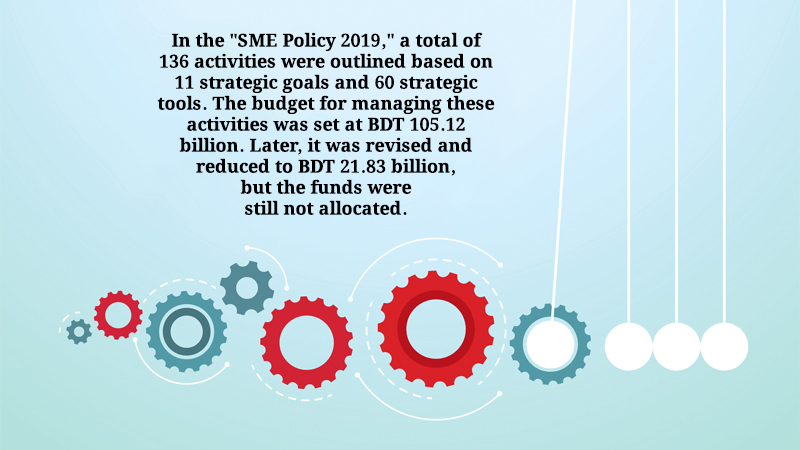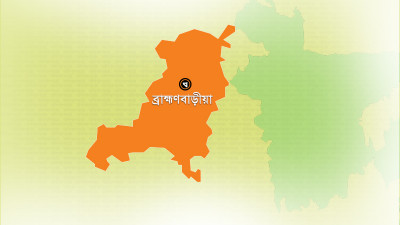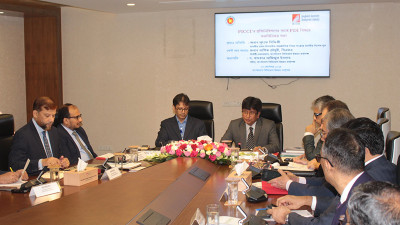 Photo: Bonik Barta
Photo: Bonik Barta Small and medium enterprises (SME) control ninety percent
of global business. A five-year "SME Policy 2019" was formulated to
develop this promising sector, which was set to expire in June 2024. However,
the activities of the relevant parties were confined to strategy development
and planning. Even the projects undertaken under this policy did not receive
any funding. Despite recommendations for budget adjustments and revisions over
time, the government did not respond. As a result, none of the plans could be
implemented.
It has been reported that the "SME Policy 2019"
outlined 136 activities based on 11 strategic goals and 60 strategic tools. A
budget of BDT 105.12 billion was initially allocated for managing these
activities. Later, revising and refining the budget to BDT 21.87 billion was
recommended. This included a recommendation of BDT 1551.6 million for the own
budget programs, BDT 15.87 billion for policy budget programs, and BDT 4.40
billion for project budget programs.
Among the 11 strategies undertaken for the development of
the SME sector were improving the business and investment environment and
institutional framework, increasing SME sector opportunities for institutional
financing, enhancing competitiveness and assisting SME products' market entry,
providing SME business support services, offering low-cost and timely startup
support, developing and expanding SME cluster-based networks, increasing the
use of information communication and other technologies, expanding education
and training programs for SME entrepreneurs, promoting women entrepreneur
development programs and providing specialized services, establishing the SME
sector as a linkage industry to large industries and providing protection for
SME products, establishing environmentally friendly industries and improving
SME capabilities in industrial waste management, institutionalizing SME
statistics, and conducting research and development activities. Two policy-making
and executive committees were established to achieve these policy goals: the
National SME Development Council (NSDC) and the National SME Task Force.
An employee working at the SME Foundation mentioned that
among the two committees established for developing this vital sector, the
National SME Development Council (NSDC) is the highest policy-making body. This
committee issued several meeting notices but has not convened any meetings
since 2022. On the other hand, the Task Force held its last meeting on May 15,
2023. Although the government’s budget did not allocate any funds for the SME
Foundation, activities such as training for SME entrepreneurs, low-interest
financing, and creating new entrepreneurs are still being conducted using
self-generated funds.
It has been reported that an initiative has been taken to
formulate a new SME policy. However, it is still in the discussion phase. When
asked about this, Anwar Hossain Chowdhury, Managing Director of the SME
Foundation, told Bonik Barta, "The industrial policy was changed from 2016
to 2022, and the SME policy was aligned with the industrial policy. We are in
the process of drafting the SME Policy 2024. We are consulting with various
stakeholders and gathering opinions. After incorporating everyone's feedback,
we will submit it to the Ministry of Industries. The ministry will then hold
several inter-ministerial meetings with the stakeholders before finalizing
it."
Regarding the budget, he said, "It cannot be said
that there was no allocation at all. However, with our budget, some needs were
met. If the budget had been increased, we could have done more according to the
entrepreneurs' demands. The budget allocation did not meet our
expectations."
The informal sector holds significant prominence in Bangladesh's
economy. According to statistics, the country's SME sector's production has
steadily increased over the past four decades. Over the last two decades, the
sector's contribution to the Gross Domestic Product (GDP) has also been
consistently rising. Currently, the contribution of the Micro and SME sector to
GDP is 25 percent. According to ADB's 2015 statistics, there are approximately
7.8 million micro, small, and medium (SME) enterprises in the cottage industry
in the country.






